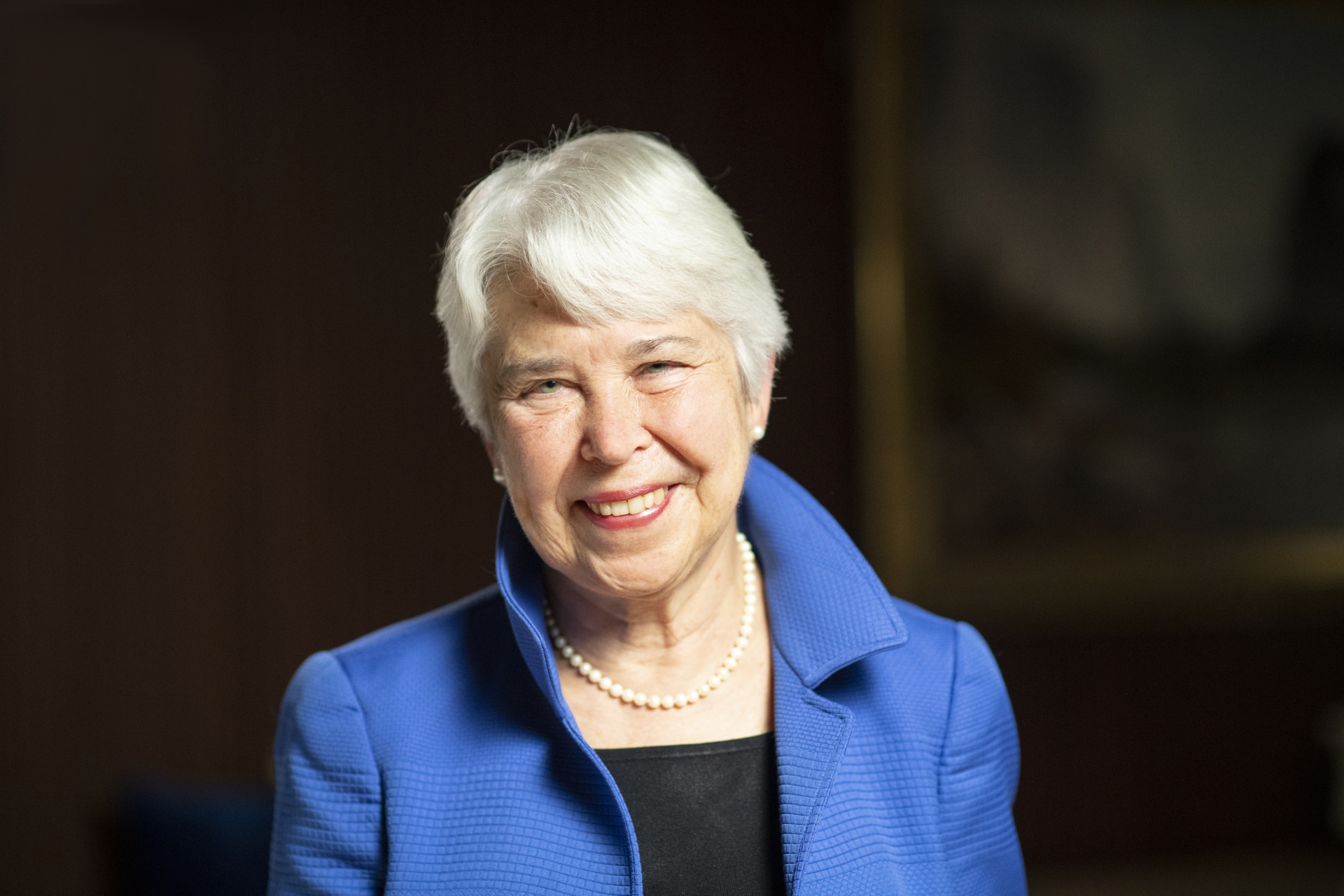Chancellor Christ talks encampment, legacy and retirement in her final Campus Conversations event

Keegan Houser/UC Berkeley
May 3, 2024
Ahead of her retirement at the end of next month, Chancellor Carol Christ reflected Thursday on her seven-year tenure leading UC Berkeley, recapping her proudest accomplishments and vexing regrets. But the encampment outside Sproul Hall and the protests sweeping college campuses nationwide were the focus of much of her final Campus Conversations event.
Specifically, Christ said she has three goals: to enable students to take finals with as little disruption as possible, ensure that graduations proceed, and minimize escalation among protesters.
“I believe that people have the right to protest, even though the protest is violating some of our time, place and manner rules,” Christ said. “You’re not allowed to camp on campus overnight. But it has been largely peaceful, and it has not been disrupting our operations. And so my stance is — as long as it stays peaceful and is not the site of pervasive harassment of others — to let the protest go on. At the same time, I’m in conversation with the leaders of the protest, trying to figure out how we can move forward.”
Christ also acknowledged that some in the community may not feel safe walking near the encampment, which has grown in the past two weeks on the Savio Steps and the north and south sides of Sproul Hall, and at times drawn counter-protesters and short scuffles. That’s why the campus set up the Wayfinders program, which provides guides to escort people through Sproul Plaza if they feel uncomfortable doing so alone.
Compared to prior protest movements, including those in the 1960s, Christ said what makes the ongoing events so challenging is that it’s not just students against campus leaders or politicians. It’s also students against students.
Christ said that has fueled a crisis that threatens the fundamental purpose of higher education as a place for the exchange and expression of differing ideas.
“We are trying to do our best to assure an environment that does not discriminate or harass,” Christ said, “but that doesn’t mean protect you from opinions with which you may very sharply disagree.”
Numerous projects on campus are being created to address challenges involving free speech and political expression, ranging from a new class for incoming students to learn about free speech to programs that train students how to have discussions or debates about challenging and sometimes confrontational topics.
“If we cannot do that, I think we are lost as an academic institution,” Christ said. “It is so important to a democracy and to the university to have the capacity to talk about ideas about which we may disagree, with the intention that we will both get closer to an understanding — empathy — with the other and also, perhaps, get closer to an understanding of the issues.”
Social media and pandemic-induced isolation have made this especially difficult, she said.
While much of Thursday’s conversation centered around protests, Christ also took time to reflect on her time as chancellor — a tenure she initially anticipated lasting fewer than five years.
She said she’s immensely proud of the significant increases the campus has made in constructing student housing. She cited the soon-to-be-completed Anchor House, which will be the first campus housing project to prioritize transfer students, and the upcoming opening of the xučyun ruwway housing complex for graduate students, as major milestones.
Christ also said she was especially proud to oversee the Light the Way fundraising campaign that raised $7.3 billion for campus capital projects.
On regrets, Christ said she has a few. While the campus has made significant strides toward its diversity, equity and inclusion goals, she said there’s a long way to go. Part of the challenge begins in high school, she said, where inequities and disparities are especially difficult to overcome. That’s something that Berkeley continues to work toward, particularly in creating a more level academic playing field as new students who had fewer opportunities arrive on campus and building a shared sense of belonging for everyone.
And despite progress being made in how Berkeley works with Indigenous communities, Christ said she wished the campus had been more successful in repatriating Indigenous ancestral remains.
“I think it is a terrible violation of those ancestors, to have them here,” she said. “I want to return them as soon as we can. That’s been slower than I would have hoped.”
Given the enormous challenges that have marked her time as chancellor — the pandemic; protests about racial justice, controversial speakers and wars in the Middle East; and budget shortfalls, to name a few — Christ thanked staff members who helped the campus navigate them and find solutions.
It’s easy, she said, to feel like Chicken Little and think the sky is falling.
“But in fact, the university has always faced challenges and, I think, really overcome those challenges very, very well,” she said. “One of the things that I so value about this university is how creative and resilient it is.”
Christ, a scholar of Victorian literature, reflected on the scientific breakthroughs recently born at Berkeley and the ongoing challenges surrounding higher education more broadly by invoking Charles Dickens and the opening line of A Tale of Two Cities: “It was the best of times, it was the worst of times.”
“I think we’re at one of those moments where there are some extraordinarily wonderful things happening in our university,” Christ said, “and some extraordinarily painful and difficult things happening in our university.”
As for retirement? Christ said she’ll board a London-bound plane on June 30 with her son and two granddaughters. Beyond that, she plans to read, write and play the viola.
“Higher education is my life,” Christ said. “I’m not going to stop thinking about higher education, writing about higher education. But I believe when you leave a job, you leave a job.”